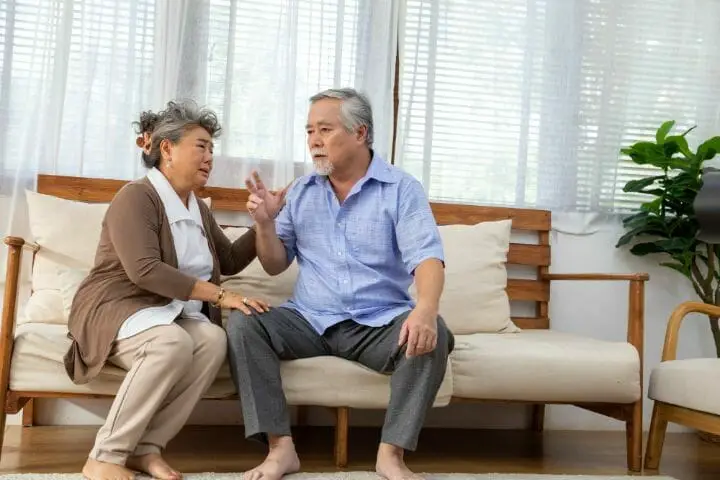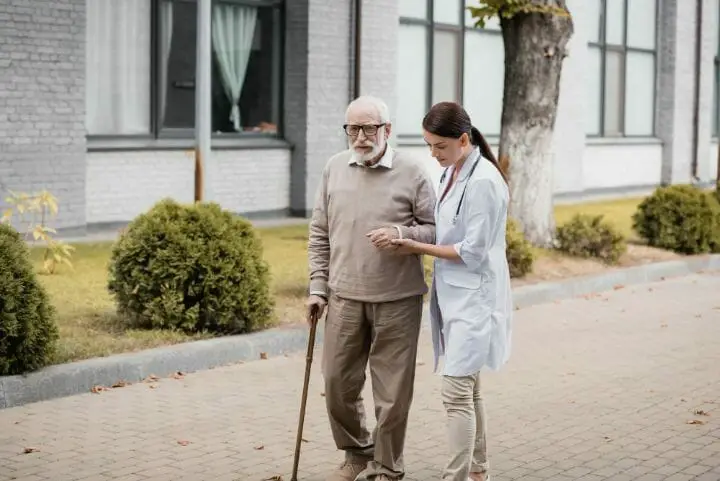Are you taking care of a senior who has grown into a paranoid, agitated, and angry person in the last few years? If the answer is yes, then you are not alone. There is a large number of people sailing in the same boat and this is the article for all those people like you.
Here, we have covered the symptoms and reasons behind elderly paranoia. We have also touched upon ways to deal with the situation through a few of the most gentle, sympathetic, and empathetic steps.
Contents
Humans are logic-driven species. It is not a surprise that when a senior shows paranoia symptoms or delusion, we try to make them understand that their experiences and beliefs are imaginary. While logic may work in most worldly situations, in the case of elderly paranoia, a logical approach may not be the best one.
Many psychiatrists believe that, regardless of the person’s age, it is not advisable to argue or explain the reason or question the existence of their experiences.
These explanations or rejection of their experiences, even virtual, not only frustrates the person but also make them suspect that you may not be taking seriously. It may push them further away, which in turn may aggravate their condition.
Our logical reality may not go along with what they may be experiencing or feeling. Family members and caregivers may have to analyze these mental symptoms and conditions, and then distinguish them from trivial behavior changes or other medical conditions.
These mental symptoms are called psychosis and are classified into hallucinations, delusions, and paranoia. Although all three may appear the same, they are defined differently in psychiatry.
While delusion means believing things that aren’t true or real, hallucination means seeing or hearing things that aren’t there. Different from Hallucination or Delusion, Paranoia has its genesis in suspicions.
Let’s try to understand the symptoms of elderly paranoia and how you would identify these symptoms as a caregiver or family member. After that, we shall also relook at the critical causes of elderly paranoia.
At the end of this article, we’ll again touch upon how one should handle these situations and respond to elders’ paranoia.
How Do You Identify It / Symptom?
Psychosis becomes common as people get older because any of these symptoms can emerge when our brains aren’t functioning correctly. It may be because of numerous reasons, not easy to identify.
Though paranoia’s genesis is in the suspicions of others, it may not come out explicitly. Seniors may exhibit varying symptoms of paranoid behavior, such as:
- seeing people who may not exist
- hearing odd noises and sounds
- feeling that others are talking bad about them behind their back
- thinking that someone may steal their money
- thinking that somebody is trying to kill them
- demonstrating extreme agitation or caution
If you analyze these symptoms, you may find that they are caused by a few trivial coincidences. For instance, strange or odd noises may be because of wind tunnels or tree branches scratching a building or each other.
Similarly, seeing living beings who may not exist may be because of a vision deficiency. Similarly, if the patient feels that the others are talking behind her back, it may also be because of a defect in her hearing aid.
Moreover, the environment an elderly is living in may cause heightened anxiety, agitation, and stress. These feelings may even aggravate if your loved one is not living at home but in a senior care home.
They may start feeling that nobody loves them or care about them. They may start getting anxious and paranoid, which may mean they are not comfortable in the new living environment.
However, regardless of the symptoms, your analysis, or initial conclusions, it is equally critical to know how you would share your findings with them. We’ll go through the topic of handling it later. Before that, let’s try to understand the most prominent reasons behind paranoid behavior in seniors.
You may also like How to Get in-Home Counselling for Seniors
Why Does It Happen? What Are the Reasons Behind Paranoia?
Once you have identified paranoia symptoms, you may try to assess the root cause of the problem. The most common reasons behind paranoia could be one or more of the following:
- Medication side effects
- Psychological disease – dementia, cognitive impairment, depression or mood disorders, delirium, or alzheimer’s disease
- Internal physiological issue – vascular damage after a stroke or head injury, urinary tract infection, or brain tumor
How to Handle the Challenge?
You may have already observed one or more symptoms of paranoia in your loved one. Though you may have or may not have identified the reason, don’t let it go unresolved because these conditions deteriorate faster over time.
You may avail the professional help of a psychiatrist or other senior care professionals before reaching a solution. Also, while evaluating potential treatments, you may want to understand:
- Is it the first time this is happening, or has it happened earlier?
- What might have happened just before the person became suspicious?
- Was the location where it is observed the same or has similar characteristics?
- Can you alter the situation, location, or something else to eliminate the potential suspicion?
- Are they taking any medication? If yes, are there any mentioned side effects? Discuss this with the doctor.
Also, taking care of an elderly can be extremely challenging, physically as well as emotionally. So, don’t forget your well-being. As touched upon earlier in brief, we should employ the elimination approach when analyzing the reasons and symptoms.
This way, we can eliminate the possibility of any physiological or environmental factors such as hearing defect, medication side-effect, or vision deficiency, etc.
When dealing with a paranoid senior, you must remain calm, patient, sympathetic, and empathetic. Focus on your tone of voice and comfort the patient, but do not try to explain her logic.
You may have to be methodical and analyze their daily behaviors to look for patterns. If you don’t know how to deal with the situation, seek advice and assistance from a senior care professional or a doctor.
If you can’t find anybody who may have handled similar cases, you may want to join online forums to seek advice. Through this, you may connect with others who have gone or going through similar challenges.
In these situations, nonverbal communication plays an important role, giving them a gentle touch, a hug, or a pat on the arm.
One thing which never works when dealing with elderly paranoia is arguing with them. So avoid that. Try to acknowledge the patient’s anger and frustration without taking her negative words personally.
Sincerely listen to her and express understanding. It will give her a sense that you have validated her feelings. Lead her towards music or take on a walk or a ride.
Keep dangerous items out of reach and avoid noise around them. Try to distract their attention. Keeping their environment familiar to them, schedule predictable, and don’t make many changes.
Entertain them with lively humor. Never laugh at them, mock them, or belittle their experiences.
If your loved one smokes or drinks, try to limit that gently and ensure she takes enough sleep. Encouraging her to do independent activities may reduce her feelings of dependency, and in turn, paranoia.
You should also take care of her dietary needs and keep reassuring her regularly that you and the whole family love her and love to take care of her.
You may also like How to Get in-Home Counselling for Seniors
How to Engage With External Help?
If you need to seek external help or medical consultation, try to secure the person in concern’s agreement before proceeding. It may not straight forward, though, because your loved one may have suspicion for everybody. So, we may use a few tips to carry out the conversation:
Once again, on the risk of repeating myself, avoid throwing logic at them as their paranoia speaks a different language than your logic does.
Moreover, logical reasoning is the last thing you may want to employ when dealing with emotional topics, particularly with people who find it difficult to believe anybody.
When making any suggestion, articulate it in such a way so it appears that you are trying to help them, not that you are trying to resolve any issue.
The last tip, may not be least, though, is that you should speak for yourself by starting your sentences with “I”, not “we”. In these situations, a “we” may give a sense that she is against many others.
I know it may not be very intuitive, but these are a few small things that matter while dealing with these tricky situations.
You may also like How Do Elderly React to Death of Their Significant Other
Conclusion
Undoubtedly, trying to take care of an older adult who may not believe you or may see everybody with suspicion is challenging. Also, it is not always easy to love and take care of somebody who doesn’t seem to appreciate, at least it may appear so.
It is a challenging trajectory to navigate and may take longer than expected time and persistence. Don’t take things personally and take care of yourself because it is easy to succumb to the same pressure.
Connect, in person or online, with others sailing in the same boat. These networks work as a great way to learn from others’ experiences and relieve yourself from any unwarranted guilt that you may develop when the situation doesn’t approve as you expect.





